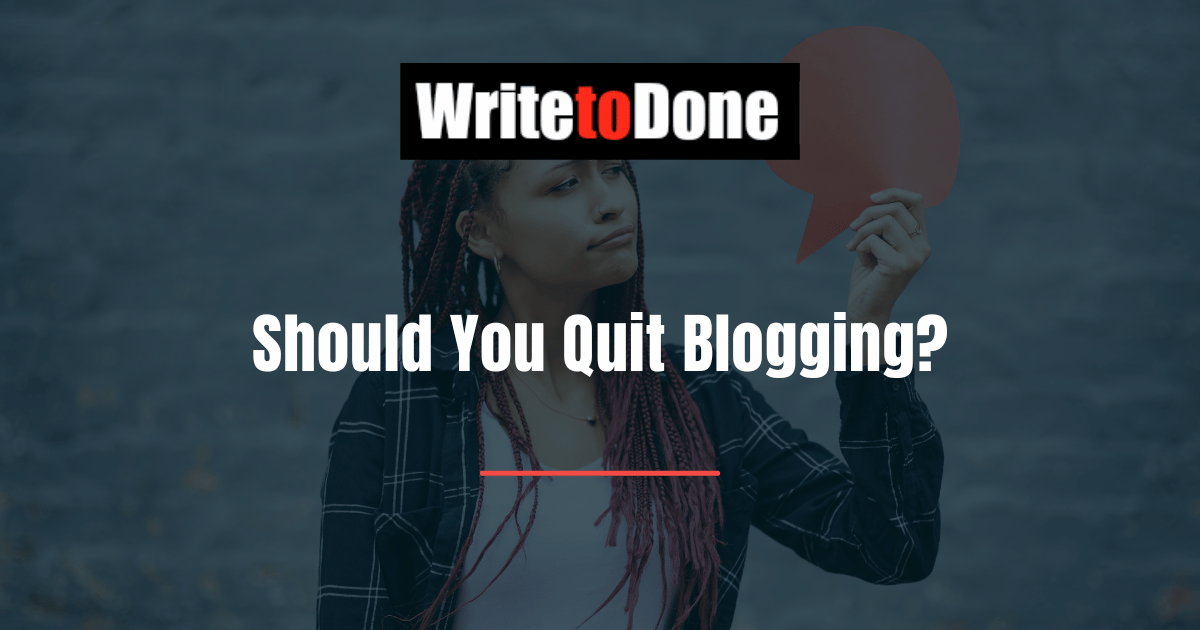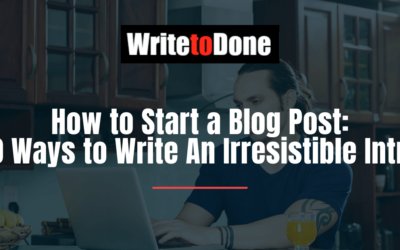Recently, I got an email from a distraught reader, Emma.
She had been planning to start a blog, but then she read somewhere that blogging was dead.
“Is it true?” she asked. “Is blogging dead? Am I too late?”
Being told you’re too late to get in on something you’re really excited about feels terrible, doesn’t it?
So was the article Emma read right?
Is blogging dead, or is it a viable pathway to success, especially for writers?
Over the years, I’ve trained over five thousand bloggers through the A-List Blogging Masterclass, so I can tell whether blogging is alive or dead.
And from all my years of experience, I can confidently say that blogging is alive and well!
In fact, if you have the right guidance, it’s now even more of an opportunity than it was a few years ago.
[message_box_yellow] Join the FREE online workshop, 5 Powerful Writing Strategies for More Shares, More Subscribers, and More SUCCESS. To register, CLICK HERE . [/message_box_yellow]
If you know what you’re doing, building an audience is actually easier than it used to be. For example, I recently increased the subscription rate of WritetoDone by a whopping 647% with free tools.
And that’s what I told Emma in my reply.
She posed another interesting question that I’ve heard from time to time: “What if, instead of a blog, I just created a normal website for my business?”
How does a ‘normal’ website differ from a blog?
The difference relates to static versus dynamic content. Static content is evergreen content that can stay the same over a longer period of time. This could be sales pages or information that doesn’t change in the short term.
In contrast, dynamic content means that you offer your readers fresh content at regular intervals.
Traditionally, the word blog denotes a website with dynamic content.
The power of a blog is that it entices readers to come back for more information.
In contrast, when readers arrive at a website with static content, they will either take action and purchase a product, or they will leave and not return.
These days, many online writers, bloggers and entrepreneurs use hybrid websites. That is, they create static websites that also include a blog. An example is Sumome, the hugely successful company which offers amazing free tools to grow your subscriber base. They have added what they call stories (which is just their fancy name for a blog).
Whatever you decision might be, static or dynamic content, the best way to build your blog is with the blogging software, WordPress.org.
Using blogging software means creating a website that you can build, maintain and run yourself.
But why create a blog instead of using social media?
Emma wrote, “You can express yourself on Facebook, Tumblr, Youtube, Pinterest, or Twitter—why should we go through all the work of finding and buying a domain, getting hosting, setting up a blog, and writing all the time?”
It’s a valid question with a very simple answer:
Ownership.
You see, if you build your online platform on Facebook or Twitter or with a free blogging service, the platform doesn’t actually belong to you.
It belongs to someone else.
You can gather thousands upon thousands of ‘likes’ on Facebook or collect a mass of Twitter followers, but your social media account can be rendered useless overnight because the online platform belongs to someone else.
If the platform goes away or you lose access, then you can never contact those followers again. They’re gone.
And then what do you have to show for all the time you’ve spent building that social media following?
Nada, nix, nothing.
Can you imagine how devastating it would be to potentially lose years of followers overnight?
Poof!
In contrast, when you build a blog and an email list, you control your access to your audience.
The best way to think of a blog is as the heart and soul of your entire “brand.”
This brand is like a hub connected to social media.
Why building a hub is the key to success
Imagine a blog as the hub of your online presence. It’s your home base. You control the content, the branding and every other aspect of it.
It’s also your monetization base. You can sell books or other products or services from this hub.
However, you also need outreach. You need to create a solid presence on social media to keep the conversation with your readers going and entice them to read the new content on your blog.
So, should you quit blogging?
If blogs were dead or dying, quitting would be the right thing to do.
Throughout the years, pundits have written about the demise of blogging.
2016: Is Blogging Finally Dead? (This is an excellent article).
2015: Are We Seeing the End of Blogging?
2014: Is Blogging Dead?
2013: The Blog is Dead
2012: Why Blogging is Dead
2011: Blogs Are Dead
2010: Blogging Has Peaked
2009: Blogging Is Dead (Again)
The truth is that blogging is alive and well. However, readers are much more discerning and many bloggers make mistakes which kill a blog.
These days blogs are doomed if…
- The content is self-absorbed and offers no benefits to readers.
- The blog design is cluttered or outdated.
- The blog is not user-friendly.
However, if your blog is a valuable resource for readers, and you connect it to a network of social media, your blog will not only survive, it will thrive.
It takes work, though.
You need determination and resilience to create and run a blog.
But it can transform your life. Like it’s transformed mine.
What are your thoughts on this? Let’s have a conversation in the comment section.
And please share this post with your friends on social media.


















